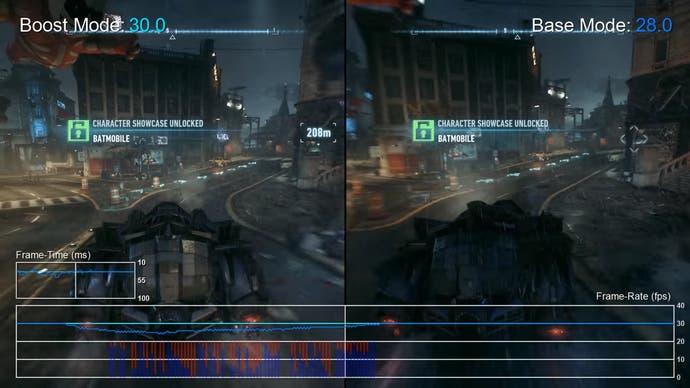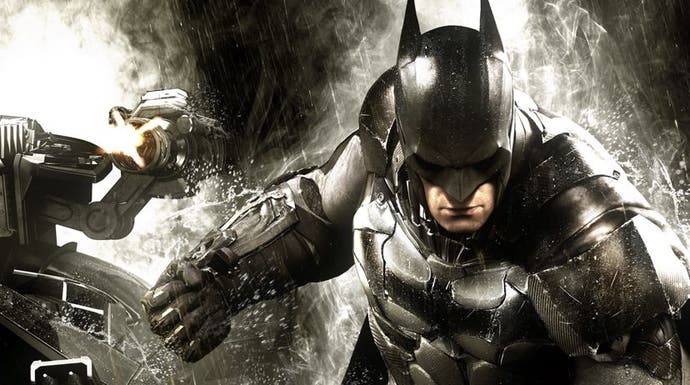Batman: Arkham Knight PC revisited - can today's best hardware deliver 4K at 60fps?
Cutting-edge PC tech takes on one of PC's most notorious ports.
This is a challenge for Nvidia's new top-tier RTX hardware that's very, very different from the usual benchmarks and gameplay tests - is it actually possible to run the deeply flawed PC port of Batman: Arkham Knight at 4K resolution at a smooth, locked 60fps? Three years on from its highly controversial launch, has the quality of the port improved at all? Can the latest mainstream PC technology attain the consistent performance level that has traditionally eluded this most baffling of ports? And perhaps more to the point - why return to Arkham Knight at all?
The last point is the easiest to answer - it's about preservation, the idea of running one of the greatest games of this generation not just on the games machine of today but on the hardware of tomorrow. Publisher Warner Bros has already taken a swing at remastering the PS360 era Arkham titles for the current generation of consoles with limited success, while Arkham Knight itself has received no support for the enhanced Sony and Microsoft machines. Through that process of elimination, the PC version is all we have to work with when the next best alternative is the 1080p30 PS4 experience running under boost mode on PS4 Pro.
And what's clear from running the PC game at higher resolutions is that Rocksteady's original assets not only hold up at 4K, they look absolutely beautiful. While some of the core effects like depth of field or the game's signature rain don't scale to higher pixel-counts so effectively, the high frequency detail, the stunning character modelling and the sheer atmosphere of Rocksteady's open world Gotham is simply phenomenal when pushed to the next level. Even before we attempt to drag the PC version kicking and screaming to 60fps, what we have here is a fascinating 'what if' - a vision of what Arkham Knight running on the enhanced consoles could potentially deliver.
But it's the performance issue that is our biggest challenge here - matching the consoles' 30fps target is no real problem. In theory, this should be easily doable. Running the game unlocked on powerful hardware easily sees the game regularly operate well north of 60fps - but average frame-rates are not the issue, it's all about the highly intrusive stutter that brings performance crashing down. Returning to Arkham Knight and running the PC port across a range of hardware, there are several issues to tackle here.
First of all, unless you like tearing a lot there's a double-buffer v-sync to contend with that can easily send frame-rates crashing down from 60fps to 30fps in a blink of the eye. Secondly, background streaming - yes, the dreaded Batmobile sections in particular - also inflicts a degree of stutter, and that's possibly down to streaming issues baked into the core Unreal Engine 3 technology. Then there's bandwidth intensive areas in cut-scenes, which can drag performance down hard. Just play through the initial diner scene, or where the Joker is torched at the game's very beginning for a couple of examples of this.
So how do we deal with all of these issues? For Nvidia users, using adaptive v-sync (we recommend the GPU control panel flavour) and a max in-game frame-rate set higher than 60fps trades occasional screen-tear for the lurching frame-rate drops caused by the double-buffer v-sync set-up. It's not ideal, but it's a clear improvement in overall fluidity. The bandwidth intensive scenes are harder to tackle, but based on RX 580 and Vega 56 testing, this may not be as much of an issue for AMD hardware, which seems more stable overall than the GTX 1060 and 1070 counterparts. This in turn raises the question - is there some kind of GPU driver bottleneck on the Nvidia side?
Background streaming problems are more challenging to overcome, though Kaldaien's Batman Tweak v1.01 helps here - its balanced and fast streaming options help to mitigate some of those Batmobile stutters.
Beyond that, it's all about brute-forcing the game with modern PC gaming technology. The remaining stutter issues are resolved simply through raw power - I tested a six-core Core i7 8700K which helped immensely, while a quad-core Core i7 7700K added some more dropped frames but was still fairly solid overall. Setting the 7700K to quad-core i5 and dual-core i3 configurations with reduced clocks to match today's locked Intel processors saw more of those dreaded dropped frames crop up during Batmobile sections. Tweaking only goes so far - we reach the point where it becomes about sheer horsepower and frankly massive amounts of overhead.
Using a monitoring tool like Riva Tuner Statistics Server, it's frankly embarrassing how little of our CPU and GPU power is actually utilised for the majority of gameplay. It seems to be the case that simply having the power on tap is required to ensure consistency. According to the RTSS overlay, AMD GPUs are utilised more effectively than their Nvidia counterparts, regularly hitting above 90 per cent utilisation while GeForce cards are in the 75 per cent range. The bottom line? In our testing, RX 580 and Vega 56 worked beautifully at 1080p and 1440p respectively when paired with an 8700K, while GTX 1060 and 1070 could randomly stutter in cutscenes, while Batmobile sections worked fine. Arkham Knight demands a lot of VRAM - a six gig minimum seems to be required, even though around 4GB is apparently used at 1080p (based on RTSS read-outs). Again, it's about overhead.
With a 4K60 resolution/performance target in mind, GeForce is the only game in town. GTX 1080 Ti is fine for the most part, but sits on an uncomfortable threshold where the double-buffer v-sync can still bring frame-rates crashing down in cutscenes and heavier gameplay scenes. RTX 2080 improves matter by a small but noticeable degree, but it's the top-tier RTX 2080 Ti paired with the i7 8700K that gives us a nigh-on locked 60fps at a beautiful ultra HD pixel-count. Based on frame-rate analysis of the initial 10 minutes of the game (a far better benchmark than the useless in-game tool) we dropped just single frames - 18 of them from an 18,000 sample. To all intents and purposes then, we're there - a virtually locked 4K60. It's not quite perfect but you'd struggle to tell and to be frank, it looks absolutely glorious.

The extreme resolution combined with a beautifully consistent frame-rate elevates Arkham Knight to the next level - it's the closest we'll get to a 4K remaster and it's simply beautiful to behold. There's still the sense that there's perhaps too much detail in some of the character rendering: moire pattern aliasing still resolves on the weave of Batman's armour, but there's no doubt - this is the elevated experience that shows us just how much work, effort and detail went into the original artwork. But as good as it looks, it also highlights that Arkham Knight remains a game of its time - its approximation of physically-based rendering and the handling of materials has a distinct, unique look but the real thing looks a lot better in more modern games. Similarly, the anti-aliasing technique is sub-par and was at launch - today's TAA would work wonders in resolving Arkham Knight's obvious shader aliasing.
In returning to the game and conscious of the performance tightrope we're walking here, we didn't run at max settings initially. Nvidia Gameworks features were disabled, and we dropped shadows to the normal setting (not that it makes a huge amount of difference). This helps with more consistency with GTX 1080 Ti/RTX 2080 class hardware and it's what was used for the capture in the main video on this page. But just how much overhead was left over on RTX 2080 Ti? Could we push further? Nvidia's PhysX smoke still has a crippling impact on performance so had to be disabled - but paper debris, light shafts and enhanced rain (which seems limited to flying droplets from the Batcape when the Dark Knight glides from a building) seem to work just fine with no obvious performance hit, while shadows can return to the max setting. Playing through the first 15 minutes of the game - a crucial litmus test for overall performance - everything works fine, with just one exception, one momentary glitch during some early gliding across Gotham.
It's a reminder that no matter how much we brute-force Arkham Knight to deliver this genuinely exciting experience, fundamentally we are dealing with a really poor PC port with an often baffling performance profile. A good example here concerns the curiously impressive AMD performance. Directly after running the game on RX 580, I swapped back to GTX 1060 and re-tested. Literally all of the performance dips I'd seen before were suddenly gone - a situation I hoped would extend to GTX 1080 Ti at 4K (but alas, its issues remained). The inconsistency in testing is frustrating but by and large, the way forward is clear - we begin by mitigating the streaming issues with Batman Tweak v1.01 then brute-force everything as far as we can take it.
The results are worth it though. Arkham Knight may be three-years-old now and the general level of optimisation in the PC port is still remarkably poor - but the game itself is a product of genius and undoubtedly one of the standout titles of this console generation. And beyond the visuals, the quality of the storytelling and mission design remains second to none. Rocksteady's next project remains unknown - and it's clearly the primary focus for the studio - but we hope that the studio's future plans also include looking after the legacy of the exceptional Arkham Trilogy. There's the sense that Return to Arkham was well-intentioned but fell short technically and the extent to which Rocksteady signed off on it is unclear. But what's clear is that Arkham Knight doesn't need a huge amount of remaster work - the game assets hold up, but PC clearly requires a technical revamp, while some degree of 'forward compatibility' for the consoles to come is the least that this brilliant title deserves.









